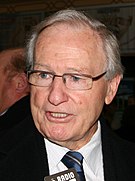New Zealand general election, 1987
|
|
||||||||||||||||||||||||||||||||||||||||
|---|---|---|---|---|---|---|---|---|---|---|---|---|---|---|---|---|---|---|---|---|---|---|---|---|---|---|---|---|---|---|---|---|---|---|---|---|---|---|---|---|
|
||||||||||||||||||||||||||||||||||||||||
|
|
||||||||||||||||||||||||||||||||||||||||
|
All 97 seats in the New Zealand House of Representatives 49 seats needed for a majority |
||||||||||||||||||||||||||||||||||||||||
|
||||||||||||||||||||||||||||||||||||||||
|
||||||||||||||||||||||||||||||||||||||||
The 1987 New Zealand general election was a nationwide vote to determine the shape of the 42nd sitting of the New Zealand Parliament. The governing New Zealand Labour Party, led by Prime Minister David Lange, was re-elected for a second term, although the Opposition National Party made gains. The election also saw the elimination of the Democratic Party (formerly the Social Credit Party) from Parliament, leaving Labour and National as the only parties represented.
Before the election, the Labour Party (in government) held 56 seats, giving it an absolute majority in Parliament. The National Party (in opposition) held 37 seats. The Democrats, a small party devoted to the principles of Social Credit, held two seats.
Of particular importance in the election were the economic reforms being undertaken by Roger Douglas, the Minister of Finance. These reforms, sometimes known as "Rogernomics", involved monetarist approaches to controlling inflation, corporatisation of government departments, and the removal of tariffs and subsidies. All these things were strongly opposed by many traditional Labour supporters, who saw them as a betrayal of the party's left-wing principles. Many commentators believed that public anger over Rogernomics could cost the government the election.
Another matter of importance, and perhaps one which enabled Labour to survive public dissatisfaction, was the nuclear issue. In the previous parliamentary term, New Zealand had adopted legislation which prevented nuclear weapons or nuclear-powered ships entering New Zealand, a move which provoked an angry reaction from New Zealand's allies in the ANZUS treaty. The National Party intended to revoke the ban, but the New Zealand public were supportive of it. Labour's support for the ban is often considered to be an important factor in the party's re-election.
...
Wikipedia


